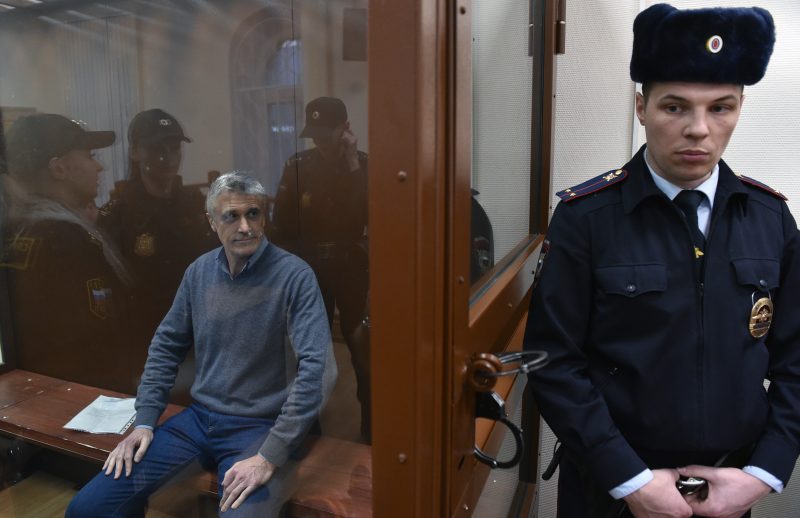Russian arrests of foreign businessmen shocks Western investors
American Michael Calvey, the head of private equity firm Baring Vostok, appears in Moscow’s Basmanny Court on February 15 after his arrest on fraud charges (Vasily MAXIMOV )
Moscow (AFP) – The arrest in Russia of prominent US and French investors on suspicion of fraud has sent shockwaves through Western business circles and sparked fears of cutbacks in foreign investment sorely needed for economic growth.
The founder and employees of the Baring Vostok private equity firm were arrested on Friday in a case brought with the help of the FSB security service.
The arrest took place on the same day Russia hosted leading business people in the Black Sea resort of Sochi for a major economic forum which trumpeted the country’s openness to investment.
Michael Calvey, a US citizen and the founder and director of Baring Vostok, has been placed in pre-trial detention in a Moscow jail for the next two months for alleged fraud, along with five others — including Philippe Delpal, a French citizen.
They are accused of defrauding Vostochny Bank of at least 2.5 billion rubles ($37.7 million). All of them deny any wrongdoing and blame the case on a shareholder dispute.
In an opinion piece on Monday in the Vedomosti business daily, Maxim Bouev — vice-rector of Moscow’s New Economic School — wrote the case proves what investors have long known: “If you want to invest in Russia, you have to accept your risk of eventually being arrested and finding yourself in the dock.”
This is the latest in a long line of cases in which top business people have been accused of crimes motivated by commercial or political interests, but these have rarely involved foreigners.
Business figures and economists reacted strongly to investigators swooping on Baring Vostok, founded 25 years ago, which has brought in investments of more than $3 billion to Russia despite the geopolitical tensions and Western sanctions of recent years.
Arkady Volozh, the CEO of Russian internet giant Yandex, defended Calvey in a statement, saying he “has always been a standard for the market of decency and law-abidingness”.
– ‘Hateful image abroad’ –
Other business leaders said they fear the case will deal a severe blow to an investment climate already marred by corruption and the lack of independent courts — especially given the strong-arm tactics employed.
“This gives Russia a hateful image abroad,” the president of the French-Russian chamber of commerce, Emmanuel Quidet, told AFP.
The chamber on Monday said it was “very concerned” about the arrests in a joint statement with the Association of European Businesses, a federation of multinational companies working in Russia.
The case could “severely damage the climate and attractiveness of Russia for direct investments from abroad”, it said.
The Kremlin sought to dispel those fears, with spokesman Dmitry Peskov saying Calvey’s arrest should “not affect the investment climate” in Russia.
He added he was aware of the contribution to the Russian economy made by Calvey, who has met President Vladimir Putin numerous times.
The government in early February unveiled a 340 billion euros ($385 billion) plan to achieve its economic goals and support growth that is forecast to slow this year. This will require major private investment.
“It’s an electric shock,” a source in the Association of European Businesses told AFP.
“You get the impression that business rivals are using the justice system and Russian (security) services to settle their scores. But the fact that the authorities are letting this happen sends out a very negative signal. You wonder who will be next.”
In the Novaya Gazeta independent newspaper, outspoken commentator Yulia Latynina claimed that in the context of current East-West tensions, “for security officials, business people are criminals and foreigners are spies”.
Disclaimer: This story is published from a syndicated feed. Siliconeer does not assume any liability for the above story. Validity of the above story is for 7 Days from original date of publishing. Content copyright AFP.


